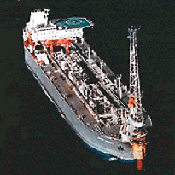International
December 1997 Vol. 218 No. 12 International Kurt S. Abraham, International Editor Gathering up the loose odds and ends As fre
Gathering up the loose odds and endsAs frequently happens at this time of the year, upstream companies are gearing down into a Western "holiday mode," moderating their efforts while employees scramble to use up vacation time. One consequence is that E&P firms tend to generate fewer stories of global importance. However, on the editorial end, we often find our desks crowded with news items that are regionally significant but too complicated to fit as short news stories. On the other hand, they may be too immediate (short shelf life) or not detailed enough to warrant conversion into feature articles. Such is the case with the following items that appear in no particular order, as your humble editor struggles to clean off his desk before 1997 comes to a close. Qatar arrives in Houston. The latest consulate opening in Houston is further evidence that upstream activity is prospering. Convinced that trade between itself and the U.S.—particularly for energy—will continue to grow, Qatar on Nov. 5, 1997, opened a new consulate general in Houston. In a ceremony downtown, Mayor Bob Lanier welcomed Qatar's ambassador to the U.S., His Excellency Saad Mohamed al-Kubaisi and the new consul general, the Hon. Sultan S. al-Merikhi. With nearly 250 Tcf of natural gas reserves, Qatar is becoming a major gas exporter, generating further interest in the country. Already, 13 oil industry firms are active in the U.S.-Qatar Business Council. "These expanding relations have witnessed remarkable growth recently, thanks to the wise policy under the leadership of His Highness, Emir Sheikh Hamad bin Khalifa al-Thani," said Amb. Al-Kubaisi. "By steering the development process, the Emir has opened the door for foreign investments to boost the country's natural resources." The consulate will facilitate investment in Qatar, said Al-Kubaisi, because his country considers Houston to be the energy capital "not only in the U.S., but also in the world." Houston has the fourth-largest U.S. consular corps, with 68 countries represented.
BHPP feels safety heat. If BHP Petroleum (BHPP) didn't have bad luck, it wouldn't have any at all. The latest safety snafu is a fire that occurred early on Nov. 10, 1997, aboard the Griffin Venture FPSO, offshore Western Australia. The fire broke out in one of five gas turbines that drive electrical generators in the engine room, but workers brought it under control fairly quickly. Subsequent inspection showed that at least two turbines and some electrical cabling were damaged. BHPP said its inspection suggested that a "mechanical fault" in one turbine might have started the fire but cautioned that it was too early to establish the true cause. Production, processing and storage functions were not damaged, but Griffin field output was halted while BHPP completed investigations in tandem with authorities. This episode follows numerous safety-related incidents onboard BHPP's Griffin Venture and Jabiru Venture FPSOs. They prompted federal officials in 1996 to commission a major review by a British offshore consultant of BHPP's safety audit procedures. He reported that the offshore safety record "in the past had not been adequate." However, BHPP in April 1997 reported that a follow-up review found that a "culture of lack of attention to safety" had been reversed. First onstream in January 1994, Griffin was producing 65,000 bopd when output was halted. SPR sale survives. Despite hopes to the contrary, the Senate version of the U.S. Interior Dept. appropriations bill for FY1998 did not prevail in a congressional conference committee. Readers will remember that the House version included a $209-million sale of Strategic Petroleum Reserve oil, sometime in 1998, to help fund Interior's operations. This editor three months ago detailed, ad nauseam, the turncoat behavior of two industry "friends," Republicans (R) Bob Livingston (Louisiana) and Ralph Regula (Ohio), on the House side. However, IPAA and other industry groups had hoped that an SPR sale would not become law after the Senate passed its own bill, sans a sale. Unfortunately, when the two bodies' Subcommittees on Interior met in conference to work out differences, the House side somehow convinced senators to adopt a $207.5-million sale. So what happened? One would think such industry "friends" as Sens. Ted Stevens (R-Alaska), Thad Cochran (R-Mississippi), Pete Domenici (R-New Mexico), Robert Byrd (Democrat-West Virginia) and Byron Dorgan (Democrat-North Dakota) could have prevented this outcome. Perhaps a clue comes from the Internet site of Sen. Slade Gorton (R-Washington), who
chairs the Subcommittee on Interior. In a news release on his web site, Sen. Gorton trumpets
how the $13.7-billion Interior bill "includes funding for Washington state interests."
These items total $27.7 million, including $9.5 million for acquisition of scenic areas and
wetlands; $7.7 million for national forest, historic site and other park projects; $750,000
for "fisheries enhancement" and $3 million for "dam acquisition." The
senator apparently couldn't pass up a plate of pork barrel goodies. For this, we honor him
with our latest "Federal Energy Dartboard Award." (You can copy his photo
from the www.senate.gov/~gorton web site and blow it up to dartboard size.) How many
other senators obtained similar pork but were not brazen enough to boast about it on their
own web sites? Copyright © 1999 World
Oil |




